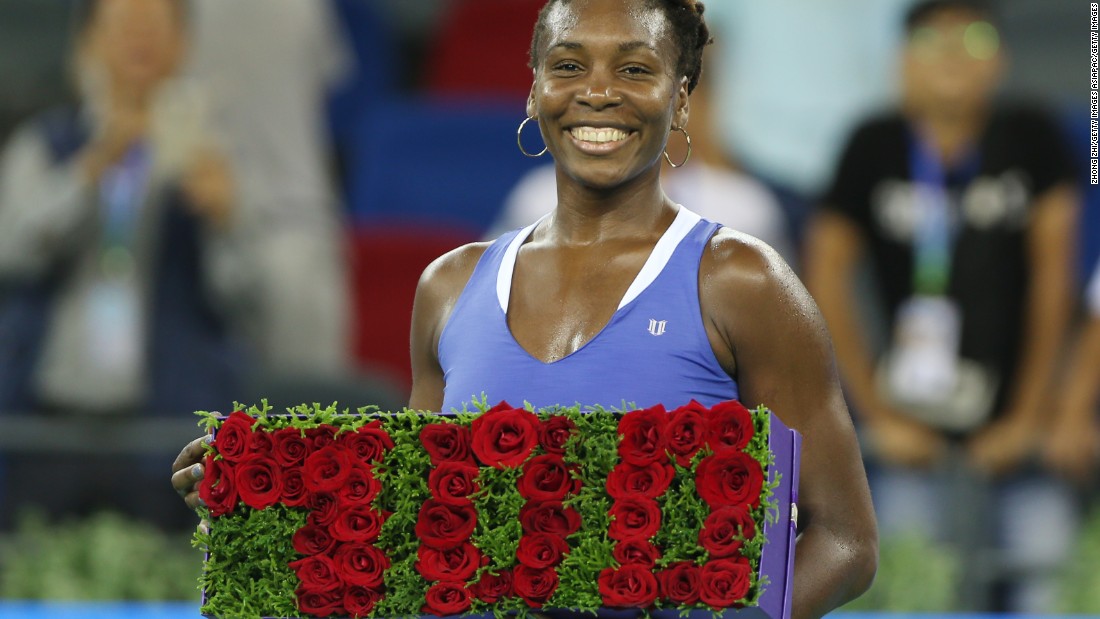
London (CNN)Take one of Asia’s biggest sports stars, a multimillion dollar investment and a Chinese city determined to compete domestically and internationally and what do you have?
The Wuhan Open.
The tennis tournament, which starts Sunday in the hometown of
Asia’s first major singles winner Li Na, is only in its third year.
Yet it has spent 1.5 billion renminbi ($225 million) on facilities that wouldn’t look out of place at any of the four majors and the entire women’s top 10 are due to take part.
“This is very much a city branding exercise,” professor Simon Shibli, head of Sheffield Hallam University’s Sports Industry Research Centre in England, said in a phone interview.
Big sports events
“Shanghai and Beijing have done it and so have places like Bahrain and Qatar. They realize that there is a global market and appetite for big sports events,” such as tennis, Formula One and soccer.
The event, owned by sports management and marketing agency Octagon, replaced Tokyo as one of the tour’s Premier 5 — a step down from the WTA’s Premier Mandatory tournaments. It was leased for 15 years to the Wuhan Sports Development Investment Co.
Last year, in an area that was far from developed three years ago, the Wuhan Open built a 1 billion renminbi ($150 million) state-of-the-art center court, complete with retractable roof, modeled on the Australian Open. It can accommodate 15,000 tennis fans, as many as Wimbledon’s Centre Court.
“New frontier”
None of it would have been possible without Li’s victory at the 2011 French Open.
“It was the new frontier for tennis in China, a new era,” Fabrice Chouquet, co-tournament director of the Wuhan Open, said in a phone interview. “What was not possible before, became possible then.”
“She has made tennis so popular in China,” Chouquet said about Li, the two-time grand slam singles winner.
“It really has taken the game to the next level, at the level of basketball, and the national sports such as badminton and table tennis.”
Economic powerhouse
Located at the convolution of the Yangtze and Han rivers in Hubei province, central China, Wuhan is using sports as a way to put itself on the map.
However the city of 10 million played an important role in China’s economic and cultural history and has a long track record as a trading hub due to its central location.
Wuhan is rapidly becoming an economic powerhouse that is outpacing national economic growth rates thanks to its fast-growing automotive industry — Nissan, Honda and Peugeot Citroen all have joint ventures in Wuhan with Dongfeng Motor, title sponsor of the tournament — high-tech industries and trade links.
The Wuhan Open, won by Venus Williams last year, is the first international top-level sports event held in the capital of Hubei. Wuhan is also home to the country’s first college of tennis. Tennis is one of three sports — soccer and swimming are the other two — that are taught in local schools.
“We want more tennis fans to come to tournaments, and want more companies to come to Wuhan,” Yi Guoqing, Wuhan’s other tournament director, said in an interview during the French Open in Paris in May.
The event attracted 75,000 fans in the inaugural edition of 2014, when it was won by two-time Wimbledon winner Petra Kvitova. That year, however,
Li retired from tennis on the eve of the tournament due to chronic knee injuries, two-time grand slam champion Victoria Azarenka withdrew due to injury and Serena Williams retired from her opener because of illness.
Williams
hinted to CNN in an interview this week she wouldn’t be returning to the circuit anytime soon after sustaining a knee injury at the US Open, putting her participation in Wuhan next week in doubt.
After tripling the size of its 5,000-seat main stadium in 2015, it welcomed 120,000 visitors last year. Yi forecast 130,000 spectators in 2016.
Revolution
In 1911, an uprising in Wuhan ended up overthrowing the Qing dynasty, ending imperial rule in China. More than a century later, the city is planning another big bang: turning itself into a mega-city cluster of 30 million people by 2025.
“The city’s tagline is ‘Wuhan, different every day’ and it literally is true,” said Chouquet, who spends about half of the year in the city. “Wuhan is growing, its economy is booming. It is transforming.”
Chouquet pointed to the Optic Valley area where the Wuhan Open is located, which is “a completely new city” with a new hospital, hotels and subway all being built.
Five years ago on the clay of Roland Garros, Li created a revolution of her own when she beat Italy’s Francesca Schiavone to become the first Chinese player to win a grand slam singles title.
Li’s victory, which was watched by 116 million television viewers in China alone, turned her into a global star overnight and
the world’s second best-paid female athlete, according to Forbes. Known for her aggressive playing style on the court and humor off it, Li also took the 2014 Australian Open title and rose to No. 2 in the world.
Hailed as a “pioneer” by former WTA boss Stacey Allaster, Li played a pivotol role in boosting the development of the game in the world’s most populous nation. Some five million people now play tennis in China, up from one million when tennis returned to the Olympics in 1988. The WTA currently hosts eight events in China, up from two in 2008.
Retirement
Earlier this year, Li became a global brand ambassador for the Wuhan Open, which flew the city’s most famous resident to Paris for an event during the French Open in May.
After playing tennis on a boat on the river Seine with fellow former French Open winner Mary Pierce, Li held a speech full of banter about her youth in Wuhan in front of an audience of French and Chinese dignitaries and dozens of members of the international press.
“Li Na in a way is a stronger brand than Wuhan to the western world,” Shibli said. “It may sound strange, because she is one person and they are a city of 10 million. She adds to the brand value of the event. It increases the appeal of the event and of the location.”
Read more: http://www.cnn.com/2016/09/22/sport/li-na-wuhan-open-china-tennis/index.html











